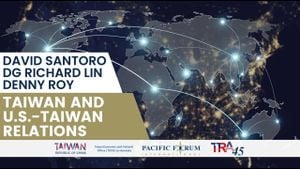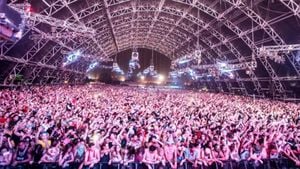Elon Musk's recent foray during the election season sparked significant intrigue, particularly concerning his $1 million-a-day giveaway, which has stirred both excitement and controversy. This sweepstakes, publicized widely through his America political action committee (PAC), has become the center of legal battles and political discourse. The allure of such substantial financial giveaways naturally raises eyebrows, leading many to ask: Is this merely a generous spree, or does it tread the line of legality?
A Philadelphia judge addressed this very question, giving his verdict on the matter after hearing arguments from both sides. Last week, Judge Angelo Foglietta ruled against attempts by Philadelphia District Attorney Larry Krasner to halt the sweepstakes, specifying why Musk's initiative did not violate Pennsylvania's lottery laws. Krasner contended the program amounted to an unregulated lottery, asserting the participation framework represented ‘scams’ targeting individuals.
According to Judge Foglietta, for something to be categorized as a lottery under Pennsylvania law, three criteria must be fully met: there must be a prize, participants must pay for chances to win, and winning must be determined by chance. The judge explained, "Credible testimony also established those selected were not determined by chance." Instead, participants had entered the sweepstakes by pledging support for fundamental rights such as free speech and the right to bear arms, earning cash payments ranging from $47 to $100, along with the chance to receive the grand prize of $1 million.
Each recipient of the $1 million prize wasn’t selected randomly but was chosen through what was described as “a multi-step process” where PAC representatives assessed their public profiles and social media posts, confirming they could serve effectively as spokespersons for the PAC at various political rallies. The judge pointed out, “Recipients signed contracts agreeing to represent the PAC at events,” which fell under permissible political activities.
Despite the court’s ruling, the process by which recipients of the sweepstakes were chosen raised alarms among some officials. Critics, including representatives from the Department of Justice, questioned whether Musk’s initiative could constitute improper influence over swing voters—individuals from key states whose electoral preferences could sway elections. Their concerns were echoed by some who viewed the sweepstakes as possibly paying for voter registration under the guise of political participation.
The sweepstakes raised various flags, especially due to the political backdrop surrounding Musk. Known for his ventures leading Tesla and SpaceX, Musk's engagement with political campaigns, especially with candidates supporting controversial policies, has placed him under scrutiny. The PAC backing the $1 million operations has reportedly contributed over $152 million to presidential campaigns and other political endeavors, actively seeking to promote specific candidates and policies.
Musk’s appeal isn’t limited to just financial incentives; it weaves seamlessly through the threads of political discourse, free rights advocacy, and engagement strategies. His supporters hail the initiative as smart campaigning, pointing to it as core political speech—essential expression meant to galvanize certain voting demographics toward cause-driven support.
This circumstance has led to mixed reactions, especially among voters and potential participants. While some appreciate the opportunity for monetary rewards within the larger democratic process, others decry what they perceive as coercive tactics aimed at manipulating voter interests. Musk's admission of participants potentially being “pre-determined” has particularly fueled allegations of misleading practices—prompting legal concerns and civil suits.
Adding another layer of drama, just as the judge ruled favorably toward Musk's course of action, another lawsuit was filed from Texas by an Arizona woman alleging fraudulent representation concerning the competition. She was not alone—many potential participants felt misled, expressing their grievances over not being adequately informed about the actual selection process of winners.
The legal tussles are far from over, as the Philadelphia DA's office's lawsuit remains on the docket. With Musk's high-profile persona and significant funding capabilities, analyzing these dynamics poses challenges for officials trying to discern if powerful figures can leverage money to influence electoral processes. Musk, who has become intertwined with recent shifts toward populist candidates like Donald Trump, symbolizes new realms of political engagement but also raises questions surrounding ethics and legality within such grand undertakings.
Elon Musk has made headlines for his various ventures, from electric cars to space travel, yet this $1 million sweepstakes offers insights beyond business innovation. It brings to light the contours of modern political campaigning, the role of money, and the mechanics of voter participation. The outcome of the lawsuits and Musk's operations serves as not only reflection points for this moment but could set precedents for how political action committees engage voters moving forward—demonstrably transforming the electoral conversation of our times.



